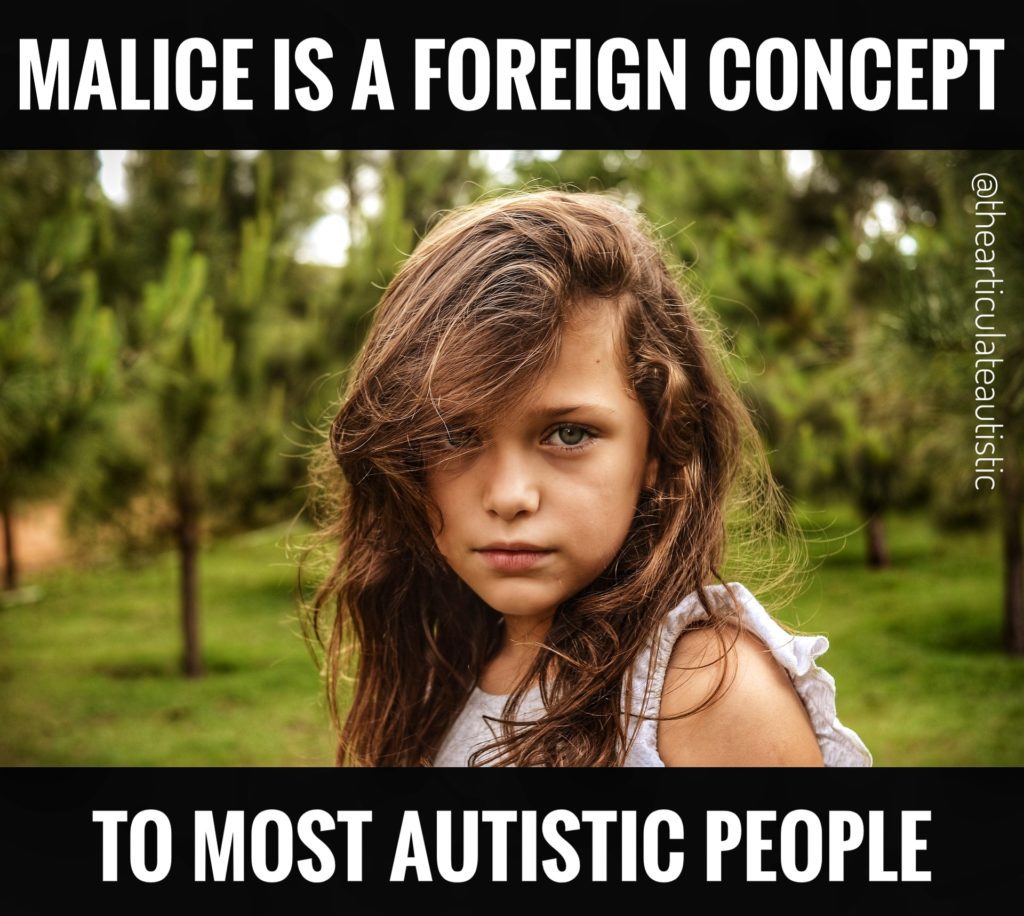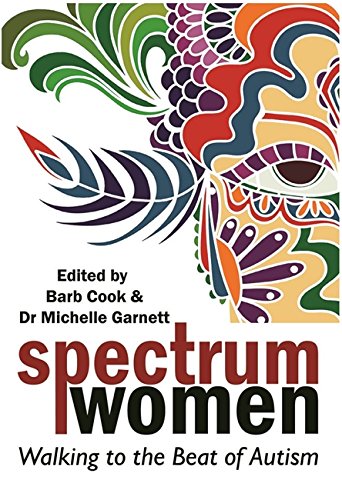Your Autistic Loved One Is Not Hurting Your Feelings out of Malice

The dictionary defines ‘malice’ as “the intention or desire to do evil; ill will”.
One of the most confusing questions anyone has ever asked me was, “You mean, you’ve never hurt anyone out of malice?!”
My response was a horrified and resounding, “Of course not!”
That got me thinking about why or how so many people find it nearly impossible to believe that there are individuals in this world who don’t hurt people “just because”.
I honestly can’t even conceive of that! Have I hurt people? Definitely! Was it just because I could? No!
I’ve hurt people because I was unaware of what was expected of me socially, because I couldn’t register the tone of my voice or a facial expression, or I was in a situation where I was concerned about self-preservation, or, even because, in the heat of the moment, I got triggered and became very angry (DBT has been a lifesaver with that).
Meltdowns, forgetfulness, social cluelessness, preferring to be alone…all of those things about me have hurt others, but…they were never purposeful and spiteful acts.
(Article continues below.)
The best way to improve communication with your autistic loved one is to understand how your autistic loved one’s mind works! Intentions, motivations, and personal expressions (facial expressions or lack thereof, body language, etc.), are often quite different in autistic people than they are in neurotypical people.
Experience a better understanding of your autistic loved one by reading books about life from an autistic perspective as well as stories that feature autistic characters. You’ll have so many “Ah ha!” moments and start seeing your autistic loved one in a different light (and you’ll have a better understanding of their behaviors, which you may have been misinterpreting up until now).
Books I recommend for a better understanding of your autistic loved one:
There was one time, when I was 13 years old, that I did something out of jealousy, and I HATED myself for it. I felt like I couldn’t wash the stain of sin off of me (I don’t mean this religiously, “sin” is the only way I can describe the feeling). What I did wasn’t a horrible thing, and it didn’t do any permanent damage, but the incident still makes me uneasy to even think about.
So, that begs the question…why? Maybe this has just been my experience, but I think one of the common reasons for misunderstandings between autistics and non-autistics is not just neurology but intention.
I think this might be why when an autistic person says or does something that offends a neurotypical (non-autistic) person that many NT people will verbally strike out right away instead of attempting to understand the intention of the autistic person because they think the intention is a foregone conclusion.
They think they already know because that’s the only reason THEY would have said or done whatever it was they found offensive to them.
Just to be sure there’s no misunderstanding here, I’m sure they ARE people on the spectrum who do things out of malice, but from what I’ve read, researched, and experienced, this is just not common.
Autistic people are not perfect angels, but we are often incredibly misunderstood and treated in a way that we don’t understand, which can cause PTSD and a whole host of other mental health issues as we move through life.
Follow me on Instagram.
Want downloadable, PDF-format copies of these blog posts to print and use with your loved ones or small class? Click here to become a Patreon supporter!







I’ve been trying to figure out my son for years. He is 32. High school was very hard for him and no he did not graduate. He is working, making money yes. I have a little understanding now but need help. Doing dishes is a big problem at home. He stays at his girlfriend’s parents house with her on the weekend. After dinner they all wash their own plate. But he won’t do it here. His dishes won’t get done at all. This is just one problem. Poop is another. Actually the way his brain works has made me concerned for a long time.
Hello, Barbara. I’m sorry you’re struggling. When you say the way his brain works “concerns” you, can you elaborate more on what you mean? Do you mean his behavior frightens you in some way, or you’re concerned for his well-being, or…? I just want to be clear on that. I definitely want to help.
Barbara my daughter has been diagnosed with autism. She is 17. It has taken me her whole life to try and figure her out. It has been only in the last two years that a light bulb has gone on in my head (like an ah ha moment) to finally start to understand and learn why or why not she does or doesn’t do or react to certain things. There has Ben an amazing difference in our relationship. I still at times have to fight with my “neurotypical” ways on occasions, but my daughter sees that I am trying and that I am FINALLY beginning to learn about autism. It truly is a REAL thing. I would definitely encourage you to read as much as you can about autism as this has helped me sooooo much. My daughter has opened up to me more than she ever has now that she sees I am beginning to understand. It is funny how things work as the more I see how she can and cannot do things the more I truly get out of her. I realize how much pain she has endured throughout the years due to the fact that I even as her mother and so many others treated her wrongly because we “neurotypical” folks expected her to act like us and if she didn’t we judged her by thinking she was not empathetic, not very nice, unsociable and just downright lazy. NOT TRUE AT ALL! She is the most caring and sweet girl I know. She is highly intelligent. I applaud her for learning not to hold a grudge on people who just can’t figure her out. She has been through the cycle of pain, anger and hurt and is now on her way to a better life. I truly am proud of her (and me too)! I love Jamie’s blog as she describes my daughter perfectly! There is hope for you and your son and so many others as long as we can educate as many neurotypical folks that we can. Now this does not mean it is possible to convince everyone that autism is a real thing, but we can surely convince some. I wish you and your son well toward a better future. Shirl